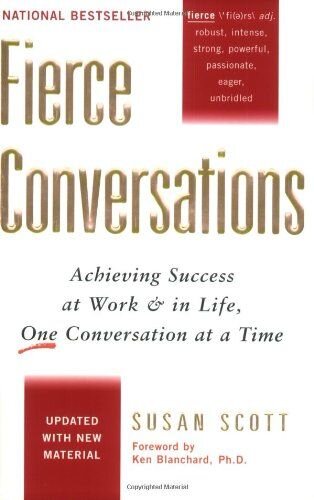Susan Scott, Fierce Conversations: Achieving Success at Work and in Life, One Conversation at a Time. Berkley Books, 2006.
Referenced in: Church Conflict – Criticism, Difficult People, Difficult Conversations
LifeandLeadership.com Summary
This Wall Street Journal best seller is based on Susan Scott’s internationally recognized consulting practice, Fierce Conversations. It represents over 13 years and 10,000 hours of helping business executives tackle tough issues and make hard decisions.
Not all churches will be open to the level of candor encouraged by these resources. Most are not “bottom line” oriented enough for the stakes to be as high as in a typical business. And most churches prize niceness over truthfulness, which is unfortunate. But church leaders who are serious about missional effectiveness or realize the widespread detrimental effect of recurring problems will welcome help in creating a climate of openness about what really matters. Resources like this will help, though one should count the cost and practice the skills with pastoral sensitivity.
Scott affirms what all know, “It takes a certain fearlessness to make your private thoughts public. But if what you’re thinking makes you squirm and wish to wriggle away, you are probably onto something.” (177) The discomfort is usually a signal that a conversation needs to occur. The challenge is how to do this. Scott offers her insight into this process.
Scott promotes Seven Principles of Fierce Communication:
Principle 1: Master the courage to interrogate reality – No plan survives its collision with reality, and reality has a habit of shifting, at work and at home. Markets and economies change, requiring shifts in strategy. People change and forget to tell each other – colleagues, customers, spouses, friends. We are all changing all the time. Not only do we neglect to share this with others, we are skilled at masking it even to ourselves.
Principle 2: Come out from behind yourself into the conversation and make it real – While many fear “real,” it is the unreal conversation that should scare us to death. Unreal conversations are expensive, for the individual and organization. No one has to change, but everyone has to have the conversation. When the conversation is real, the change occurs before the conversation is over. You will accomplish your goals in large part by making every conversation you have as real as possible.
Principle 3: Be here, prepared to be nowhere else – Our work, our relationships, and our lives succeed or fail one conversation at a time. While no single conversation is guaranteed to transform a company, a relationship, or a life, any single conversation can. Speak and listen as if this is the most important conversation you will ever have with this person. It could be. Participate as if it matters. It does.
Principle 4: Tackle your toughest challenge today – Burnout doesn’t occur because we’re solving problems; it occurs because we’ve been trying to solve the same problem over and over. The problem named is the problem solved. Identify and then confront the real obstacles in your path. Stay current with the people important to your success and happiness. Travel light, agenda-free.
Principle 5: Obey your instincts – Don’t just trust your instincts – obey them. Your radar screen works perfectly. It’s the operator who is in question. An intelligence agent is sending you messages every day, all day. Tune in. Pay attention. Share these thoughts with others. What we label as illusion is the scent of something real coming close.
Principle 6: Take responsibility for your emotional wake – For a leader, there is no trivial comment. Something you don’t remember saying may have had a devastating impact on someone who looked to you for guidance and approval. The conversation is not about the relationship; the conversation is the relationship. Learning to deliver the message without the load allows you to speak with clarity, conviction, and compassion.
Principle 7: Let silence do the heavy lifting – When there is simply a whole lot of talking going on, conversations can be so empty of meaning they crackle. Memorable conversations include breathing space. Slow down the conversation, so that insight can occur in the space between words and you can discover what the conversation really wants and needs to be about. (xv-xvi)
She provides instruction, examples, illustrative stories, and exercises that constitute a step-by-step guide to following these principles on the most challenging issues.
From the Publisher
The Wall Street Journal bestseller, now with new material.
The master teacher of positive change through powerful communication, Susan Scott wants her readers to succeed. To do that, she explains, one must transform everyday conversations employing effective ways to get the message across. In this guide, which includes exercises and tools to take you step by step through the Seven Principles of Fierce Conversations, Scott teaches readers how to:
- Overcome barriers to meaningful communication
- Expand and enrich conversations with colleagues, friends, and family
- Increase clarity and improve understanding
- Handle strong emotions-on both sides of the table
About the Author
Susan Scott’s firm, Fierce Conversations, Inc., is an internationally recognized leader in executive education, focused on achieving results through skillful and courageous dialogue, facilitating Fierce Conversations, Fierce Leadership, and Fierce Coaching programs for CEOs and company leaders.
***For additional information on this resource, including reviews, click the bookstore links. Check the reference at page top or the links below for resource guides on related topics.***
Related Areas
See Other Resources on Church Conflict:
See Resources on Over 100 Areas of Ministry Leadership:


